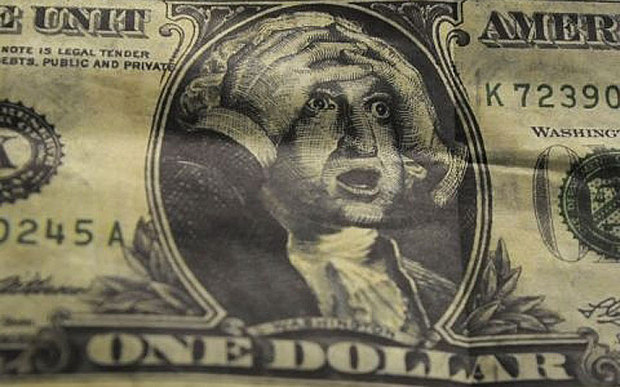
“Make America great again,” says Donald Trump, the US Republican Party’s presumptive presidential nominee. He sums up his foreign policy with the slogan “America First”: The United States should do everything possible to sustain its geopolitical dominance, friends and allies be damned. So who is the biggest threat to US primacy? China? Russia? ISIS?
The answer is none of the above. The real threat is Trump himself, the consummate (at least in his own mind) dealmaker. But the “art of the deal” that he seems to have in mind for the US apparently takes the word “art” literally: His vision of US economic and financial relations with the world is the product of a fevered imagination.
Consider his statements about the US federal government’s persistently growing debt. Trump recently suggested that the US should negotiate with its creditors to buy back much of its debt at a discount – in effect, a partial default on trillions of dollars of liabilities, intended to reduce the burden of debt service for taxpayers.
Trump boasts that he did the same sort of deal when his casinos ran into trouble. He built his commercial empire with debt, and then walked away when business went south, as it did in Atlantic City. So why not do the same kind of deal for the American empire?
Most informed commentators have rightly recoiled in horror. Even the hint of a default would jeopardize the government’s credit rating and raise the cost of future borrowing. Treasury bond prices would tank and in the end taxpayers would be saddled with even higher debt-service payments.
Worse, the dollar’s role as an international currency would be jeopardized, which in turn would severely impair America’s superpower standing. The greenback’s worldwide popularity enables the US to project power around the globe – to maintain military bases and facilities in over 100 countries, to keep naval battle groups afloat from the Mediterranean to the Pacific, and to help defend allies from Europe and the Middle East to Japan and Korea. In effect, America pays for all this simply by printing more dollars, secure in the knowledge that most of those dollars will remain in foreign hands.
Some are actually held in the form of paper greenbacks. By value, some 60-70% of all the banknotes issued by the Federal Reserve are in permanent circulation outside the US. Most, however, are invested in dollar-denominated financial claims – above all, bills or bonds issued by the US Treasury. So long as foreign investors and central banks are content to continue piling up holdings of US debt, America can go on spending whatever is needed to sustain its many security commitments around the world, as well as finance its trade and budget deficits.
The benefits derived from the dollar being the world’s main reserve currency constitute the “exorbitant privilege” about which France’s then-finance minister, Valéry Giscard d’Estaing, complained in the 1960s. Because of the greenback’s continuing attractiveness as a store of value, the US still enjoys that privilege today.
Why do foreigners have such a huge appetite for greenbacks? Financial analysts are inclined to explain it in terms of America’s extraordinarily well-developed financial markets, which promise unparalleled liquidity. Turnover in the government-bond sector alone is more than a half-trillion dollars a day. Nowhere else are there markets of such depth, breadth, and resilience. Investors can count on an exceptionally high degree of exchange convenience and capital certainty.
But that is only half the story – and not even the more important half. The greenback enjoys a unique advantage as a safe haven. In the world of finance, where crises are not uncommon, investors need a secure place to park their money. And the US today is by far the best source available for safe investment-grade assets on anything like the scale required. Former Secretary of State Madeleine Albright liked to describe the US as the “indispensable nation.” For creditors around the world, the greenback remains the “indispensable currency.”
But all that could change if Trump has his way and begins to treat dollar holders as chumps and suckers. Who would consider the dollar a safe haven if a partial default seems imminent? A flight to other currencies – the euro, yen, pound, or even the Chinese renminbi – would be a near certainty, which would almost certainly force the US to cut back on its military spending overseas. The “exorbitant privilege” would be lost, and the US could no longer realistically aspire to preserve its dominant place in world politics. Trump’s rhetoric notwithstanding, America could no longer afford to be “first” – or perhaps even second or third.



Expositores: Oscar Vidarte (PUCP) Fernando González Vigil (Universidad del Pacífico) Inscripciones aquí. Leer más
Una retrospectiva para entender los próximos cuatro años. Leer más
En la conferencia se hará una presentación de los temas más relevantes del proceso de negociación se llevó a cabo desde el 2012, así como del acuerdo de paz firmado entre el Gobierno colombiano y la guerrilla de las FARC a finales del 2016. Se analizarán los desafíos y las... Leer más
El Observatorio de las Relaciones Peruano-Norteamericanas (ORPN) de la Universidad del Pacífico es un programa encargado de analizar y difundir información relevante sobre la situación política, económica y social de Estados Unidos y analizar, desde una perspectiva multidisciplinaria, su efecto en las relaciones bilaterales con el Perú.
© 2026 Universidad del Pacífico - Departamento Académico de Humanidades. Todos los derechos reservados.

